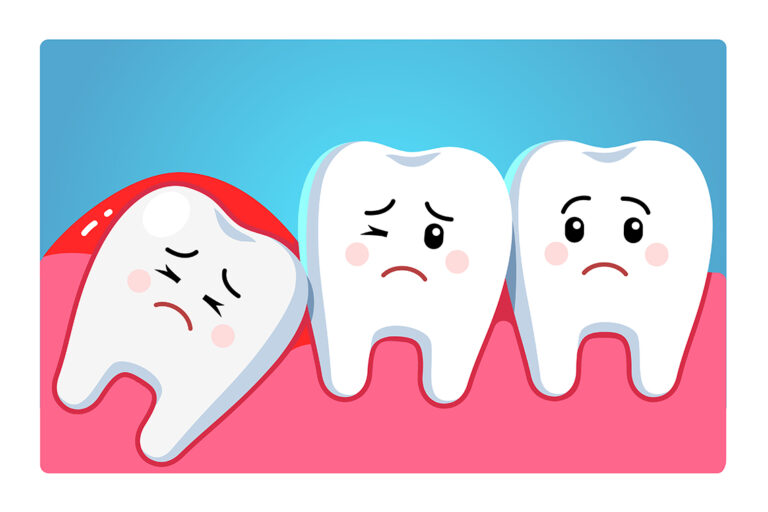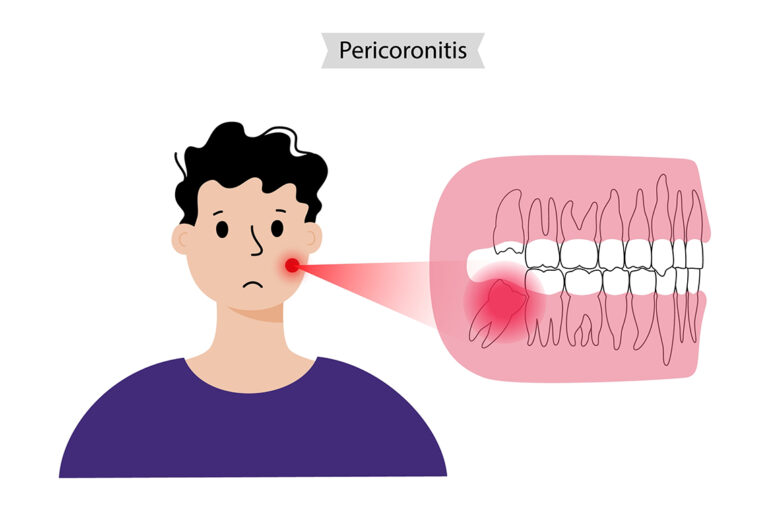Impacted Wisdom Teeth/Tooth, Pericoronitis
The meaning of pericoronitis is the infection and swelling of the gum surrounding an impacted wisdom tooth. Impacted wisdom teeth extraction in Brisbane is a cure for pericoronitis. More pericoronitis treatments are listed below.
What Are Wisdom Teeth?
Third Molars
A wisdom tooth is a third molar that usually erupts between ages 17 and 21. People typically have four wisdom teeth; two on the top of the mouth and two on the bottom.
Impacted Wisdom Teeth
If your wisdom teeth or third molars become trapped underneath gums or jawbone or can erupt partially into the mouth, they’re called “impacted wisdom teeth”.
Wisdom teeth become impacted if your jaw lacks enough room for them to emerge or erupt in the correct position. An impacted wisdom tooth can cause several oral health issues like gum disease or dental decay and needs urgent care by an emergency dentist in Brisbane.
Complications an Impacted Wisdom Tooth Can Cause
If your wisdom tooth has not emerged correctly through the gumline and is impacted, you may experience the following symptoms of pericoronitis:
- jaw and ear pain
- infection
- tender and swelling gums
- bad taste in the mouth
- bad breath
What Is Pericoronitis?
“Inflammation of the gum tissue around a wisdom tooth”
Pericoronitis refers to the infection and swelling of the soft tissues surrounding impacted wisdom teeth.
Simply put, pericoronitis is a “wisdom tooth infection”.
Pericoronitis typically affects:
- people over 20 years old and under 40
- the lower third molar
What Causes Pericoronitis?
Operculum: A flap of gum tissue (soft tissue growth) on top of a partially erupted wisdom tooth. The operculum can trap food debris and causes bacteria to flourish, and lead to gum tissue inflammation. Accumulated food particles and bacteria cause an abscess to form underneath the operculum.
The abscess can lead to pericoronitis by spreading infection if left untreated.

What Are Signs and Symptoms of Pericoronitis?
The severity of the infection will typically determine the severity of symptoms of pericoronitis. Pericoronitis symptoms range from severe symptoms or mild ones.
Chronic Symptoms of Pericoronitis
- bad breath
- bad taste in the mouth
- a dull pain that can last for 2 days
- mild pain and discomfort in the overlapping gum flap
- the swollen gum tissue around the affected tooth (around the partially erupted tooth)
- pus coming from the swollen gum tissue
- painful biting
- localized swollen tissue and redness
- discomfort while opening the mouth
Acute Symptoms of Pericoronitis
- severe pain
- pain while swallowing
- fever
- swollen lymph nodes
- jaw spasms
- discharge of pus
- swelling on the side of the face with the affected wisdom tooth
The symptoms may last 3 to 4 days.
Types of Pericoronitis
Pericoronitis can either be chronic or acute.
Chronic pericoronitis
Chronic pericoronitis refers to a mild inflammation of the area with minor or no symptoms. Chronic symptoms of pericoronitis are persistent and recurring but typically last 1 or 2 days.
Acute pericoronitis
Acute pericoronitis occurs when mild symptoms turn into more severe symptoms and the infection spreads. The condition can cause severe pain, swelling, and fever.
People with poor oral hygiene are more likely to develop acute pericoronitis.

Is Pericoronitis Life-Threatening?
In severe pericoronitis, the infection may spread to other body parts like the jaw and neck. While it is rare, complications caused by pericoronitis can be life-threatening. Our emergency dentist in Brisbane Queensland Australia is open 24/7 to treat severe pericoronitis. Visit your dentist immediately as soon as you notice the early signs of pericoronitis to prevent possible pericoronitis complications.
What Are Pericoronitis Risk Factors?
People who are in their 20s and have a poorly erupting tooth are more likely to develop pericoronitis.
Some common risk factors include:
- the presence of excess gum tissue covering on top of a wisdom tooth
- poor oral hygiene
- difficulty cleaning the affected tooth due to lack of access
- stress
- excess gum tissue
- being between 20 to 29
A person’s overall general health will not increase their risk of developing pericoronitis. Gender is not considered a risk factor either.
How To Prevent Pericoronitis?
Conscientious oral hygiene can always be beneficial and is highly recommended by Brisbane dentists to prevent several dental health issues.
Meticulous oral hygiene includes:
- proper tooth brushing with a soft-bristled toothbrush and fluoride toothpaste twice a day
- flossing at least once daily to get rid of food debris between teeth
- arranging regular dental visits to ensure dental health
Need more information about wisdom teeth and wisdom teeth extraction? Here’s the link: Wisdom Teeth
Pericoronitis Treatment
What Are Home Remedies?
You will need a skilled dentist to treat pericoronitis. During a clinical evaluation, your dentist or oral surgeon will diagnose pericoronitis and determines the best course of action.
Treatments include:
Saltwater: Rinsing the affected area using warm salt water or diluted hydrogen peroxide may also alleviate milder symptoms of pericoronitis.
Proper cleaning of the area: Your dentist may try cleaning the area thoroughly and removing any food debris if the patient’s symptoms are localized.
Oral antibiotics: The dentist may prescribe antibiotics to clear up the infection if the patient’s cheek, jaw, or neck are swollen.
Pain relievers: Taking pain relievers can help manage the patient’s pain and subside swelling.
Minor oral surgery: The overlapping gingival tissue will be removed during surgery. Removal of the operculum will let the patient clean the area better and prevent the accumulation of food particles and bacteria. An oral and maxillofacial surgeon will perform the surgery.
Wisdom tooth extraction in Brisbane: Some dentists decide to extract wisdom teeth to prevent any possible complications.
Sometimes, the gum tissue may grow back even after removing the gum flap. Therefore, extraction of the wisdom tooth may be the viable option.
Severe cases of pericoronitis cannot be managed by home remedies and require professional oral care to prevent the risk of complications.




































